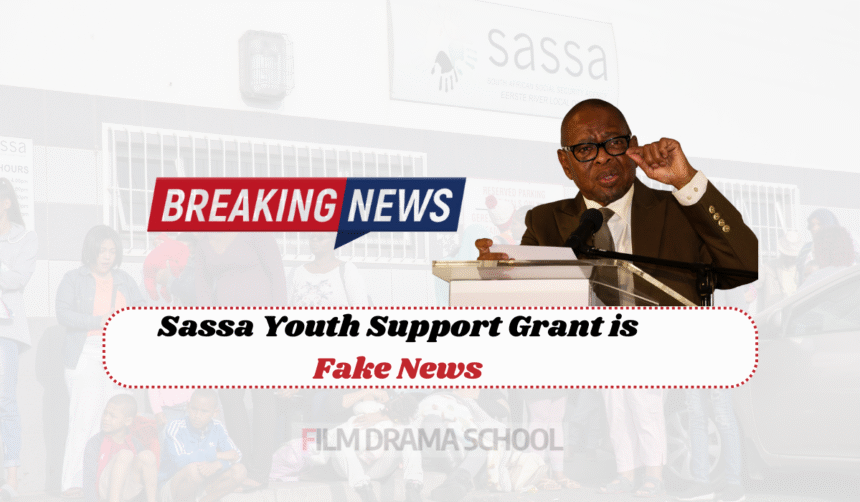Sassa Youth Support Grant is Fake News. The SASSA Youth Support Grant making rounds on social media and WhatsApp groups is nothing more than fake news. Many South Africans, especially young people looking for opportunities to start their own businesses, have fallen victim to this misinformation.
This guide will break down what the so-called “Youth Support Grant” scam is, how it spreads, how to verify official SASSA updates, and steps you can take to protect yourself from fraudulent schemes.
What is the SASSA Youth Support Grant Scam?
The scam revolves around a fabricated grant allegedly offered by the South African Social Security Agency (SASSA) to young entrepreneurs. The fake story claims that SASSA is providing R12,500 to youth who wish to start or grow their businesses.
The misleading information is primarily spread online through:
- Fake news websites
- Social media posts
- WhatsApp group messages
- Hijacked or cloned websites
While the grant sounds appealing, there is no record or official announcement about such a program on the official SASSA website (www.sassa.gov.za).
How the Fake News Spreads
Misinformation targeting young South Africans is being published almost daily. The SASSA Youth Support Grant scam follows a typical disinformation pattern:
| Step | Description |
|---|---|
| 1. Fake Article Creation | Fraudsters create a news article on a suspicious website about the “Youth Support Grant.” |
| 2. Social Media Sharing | Links are circulated on Facebook, Twitter, TikTok, and Instagram. |
| 3. WhatsApp Forwarding | The article link is forwarded to multiple WhatsApp groups, increasing trust through repeated exposure. |
| 4. Victim Clicks the Link | Curious readers click the link and may be prompted to share personal information. |
Note: The more people see the story from multiple sources, the more likely they are to believe it.
Why This is Dangerous
Falling for the SASSA Youth Support Grant fake news can lead to:
- Identity theft – Criminals can use your personal information to commit fraud.
- Financial loss – Scammers may ask for a “processing fee” to apply for the fake grant.
- Phishing attacks – Clicking suspicious links can compromise your device or online accounts.
- Misinformation spread – Sharing the false story gives it credibility, tricking even more people.
How Fake News Networks Operate
The scam is part of a broader network of suspicious websites that publish identical, fictitious stories.
For example, one such site, npssu.edu, used to be the official website of the National Shikshan Sansthan, an educational institution in India. According to media reports, such websites can be hijacked and repurposed to spread misinformation.
In South Africa, News24 has previously uncovered disinformation networks that use hijacked domains to push fake stories, including the fabricated “congestion tax” story.
How to Verify If a SASSA Grant is Real
Before believing or applying for any SASSA grant, take these steps:
| Verification Step | Action |
|---|---|
| Check the Source Website | Look for the domain name. Official South African government websites usually end in .gov.za. |
| Visit the Official SASSA Website | Go directly to www.sassa.gov.za to see if the announcement is listed. |
| Look for Press Council Membership | Legitimate South African news sites are part of the Press Council and follow the Press Code. |
| Search for Official Statements | Use Google to find any press releases from SASSA or the Department of Social Development. |
| Avoid Suspicious Links | If the link looks strange, do not click it or provide any personal details. |
Official SASSA Grants and Support
While the SASSA Youth Support Grant is a hoax, SASSA does provide legitimate support to South Africans through various social assistance programs:
| Grant Type | Purpose | Monthly Amount (as of 2025) |
|---|---|---|
| Older Persons Grant | For pensioners aged 60 and above | R2,180 – R2,200 |
| Disability Grant | For people unable to work due to disability | R2,180 |
| Child Support Grant | For caregivers of children under 18 | R530 |
| Foster Child Grant | For foster parents of children | R1,130 |
| SRD R370 Grant | Social Relief of Distress for unemployed individuals | R370 |
| Care Dependency Grant | For caregivers of severely disabled children | R2,180 |
Important: None of SASSA’s legitimate grants require applicants to pay a fee or click on third-party website links to apply.
Why the SASSA Youth Support Grant is Fake
Here are the main reasons this so-called grant is not legitimate:
- No official SASSA announcement – It’s absent from www.sassa.gov.za.
- No government press release – The Department of Social Development has not confirmed it.
- Suspicious source websites – Many use hijacked domains or non-South African servers.
- Not covered by credible news outlets – Reputable news sources registered with the Press Council have not reported it.
Tips to Avoid Falling for Fake Grant Scams
- Be skeptical of any grant offering large sums of money out of the blue.
- Verify details with official government sources before applying.
- Avoid clicking links sent through unsolicited messages.
- Educate friends and family about fake news patterns.
- Report fake grant offers to SASSA or the South African Police Service (SAPS).
How to Report Fake SASSA News
If you come across a suspicious message or website claiming to offer a SASSA grant, you can report it via:
- SASSA Toll-Free Number: 0800 60 10 11
- SASSA Website Contact Form: www.sassa.gov.za
- SAPS Crime Stop Line: 08600 10111
The Role of the Press Council
The Press Council of South Africa exists to ensure journalistic integrity. Media organisations that are members must verify information before publishing it. If a news story is not covered by any outlet registered with the Press Council, it’s a major red flag.
FAQs About SASSA Youth Support Grant
Is the SASSA Youth Support Grant real?
No. The so-called SASSA Youth Support Grant offering R12,500 to young entrepreneurs is fake. SASSA has issued no such program.
How can I verify if a SASSA grant is legitimate?
Always check www.sassa.gov.za for official announcements. Avoid links shared on social media or WhatsApp unless they come from credible, official sources.
What should I do if I’ve already shared my details with a scammer?
Contact your bank immediately to secure your accounts, report the incident to SASSA, and file a case with the SAPS to prevent identity theft or further fraud.
Conclusion
The SASSA Youth Support Grant is a dangerous scam designed to exploit the hopes of South African youth. By understanding how fake news spreads and taking steps to verify grant offers, you can protect yourself and help stop the spread of misinformation. Always rely on official channels and never provide personal or financial information to unverified sources.



















